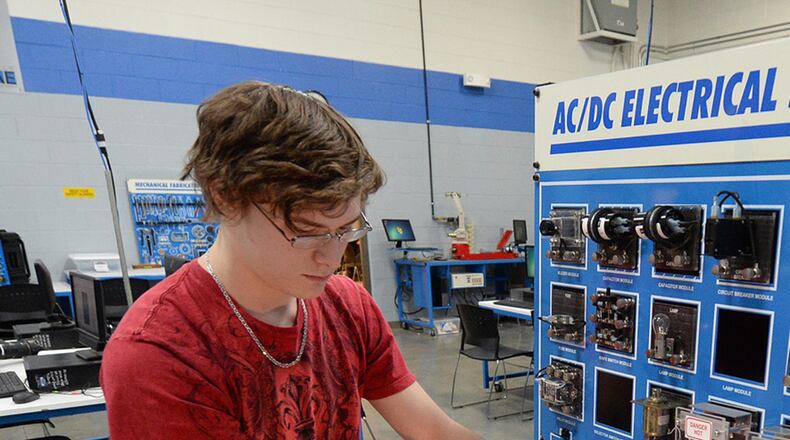Highlights of the state’s “Career Pathways” program:
- The state is directing ninth-graders to pick one of 17 broad career "clusters, " such as finance or health sciences. They can opt instead to take more college prep courses, such as world languages, fine arts or advanced-placement courses, although officials hope college-bound students will voluntarily take career-specific classes as well.
- Vocational programs have long been offered in Georgia high schools. But, with the new mandatory clusters, the state is following a national trend to align coursework with the needs of employers.
- Students will obtain three of 23 credits they need for graduation through the "Career Pathways" program, but critics have raised doubts that a high school freshman is capable of making a decision with potentially lifelong impact.
Asfand Sheikh types on a keyboard used to operate a robotic arm resembling something straight out of science fiction or a video game.
But this is no game for the 17-year-old. He’s trying to land a job in Georgia’s carpet manufacturing industry, whose biggest companies have given money to fund the robot and other equipment to schools to train students like Sheikh.
“I would love to go work” for a carpet manufacturer, said Sheikh, who attends Northwest Georgia College and Career Academy in Dalton. “I already know some of the software, so it would be a lot easier for me to work there.”
Businesses across the state are playing an increasingly active role in Georgia education, contributing millions of dollars for equipment and other resources to schools and helping shape curriculum as part of an effort to prepare students to work for them or in related industries.
The outpouring from business is tied to the state Department of Education’s new “Career Pathways” program, which directs ninth-graders to pick one of 17 broad career “clusters,” such as energy and manufacturing. The program is intended to improve dismal graduation rates and prepare students for the workforce.
But critics raise doubts about whether high school freshmen are capable of focusing on a career path, and express concerns that aligning coursework with the needs of employers can lead to a narrowing of the education process.
Business leaders contend more qualified workers are needed to do high-skilled jobs in Georgia, and say corporate financial contributions help fill in the gaps left by steep budget cuts in recent years.
“School systems cannot do this alone,” said Stephen Dolinger, president of the Georgia Partnership for Excellence in Education, an advocacy group with ties to Georgia business. “They have students for 6 hours a day. During that time, they’re never going to have enough human and financial resources to really help produce the caliber of students we need. So it’s good for businesses to partner with them.”
Shaw and Mohawk carpet manufacturers and other businesses in the industry have given upward of $1 million to equip Sheikh’s school and others in the Dalton area, according to Brian Cooksey, director of operations, training and development at Shaw Industries.
“To sustain our business, we have to have an educated workforce and folks who have higher skill levels than maybe they had to have 20 or 30 years ago,” said Cooksey, who estimates the flooring industry in Georgia employs close to 40,000. “With automation, it’s very critical to sustain our business and our state economy.”
“We need to make sure our business industry and education partners are talking together about the types of jobs that are out there, the types of jobs that are coming. The types of things we need people to do.”
At Georgia Power, employees go into elementary, middle and high school classrooms to talk to students about electricity conservation and other related topics to drum up interest in working at the company, one of the largest employers in the state with nearly 8,000 workers.
So far, Georgia Power’s Learning Power program has been shared with close to 145,000 students in about 619 schools across the state. Georgia Power also offers paid internships at the company for teachers in math, science and technology-related fields.
“We hire a lot of technical-type employees … and we were seeing more and more prospective employees struggling to pass those (pre-employment) tests,” said Henry Kelly, an executive with Georgia Power, who helps coordinate the company’s education efforts. “So we felt we needed to potentially get more engaged in a hands-on basis with helping students … understand about energy.”
General Electric, which employs close to 2,500 people in metro Atlanta, remains another major business contributor to schools in the state. In 2007, the GE Foundation awarded a $22 million grant to Atlanta Public Schools to help improve science and math programs.
The company also helps support about 14 different robotics teams in metro area schools to boost students’ interest in science, energy and other related fields, said Kami Luigs, who helps direct education programming for GE in Georgia.
“We know there are not enough kids interested in STEM (science, technology, engineering and mathematics) jobs,” said Luigs. “And they’re going to have to figure out the answers to questions we haven’t even asked yet. So how can we help spark their interest and get them enthusiastically engaged in discovery and things like that?”
Georgia Power and other businesses worked with the state Department of Education in devising its Career Pathways curriculum. Leaders within the Georgia Chamber of Commerce also provided input into the curriculum for Career Pathways, according to chamber officials.
“[Businesses] want to ensure students and their well-being and their future’s better, but they’re also doing some of the training of their own so those students will hopefully come to work for them,” said Matt Cardoza, a spokesman for the Georgia Department of Education. “It’s good for students too, because they can get some of the industry credentialing. They may have something lined up before they ever leave high school — a pretty-good-paying job.”
Hal Salzman, a professor with the John J. Heldrich Center for Workforce Development at Rutgers University, noted that more states are adopting school-to-workforce education models, a narrowing of focus that can be potentially limiting to students.
“Education certainly is not just job training,” Salzman said. “It’s to provide good citizens, a broad set of skills. And the idea of narrowing education … it’s a balance. You want people to be employable but I don’t think we need to narrow education.”
“Who knows what’s going to be available (in terms of jobs) in five or 10 years. So what you want is somebody with a broad education,” Salzman said. “The key point is, ‘What’s the right balance?’ ”
About the Author
Keep Reading
The Latest
Featured



